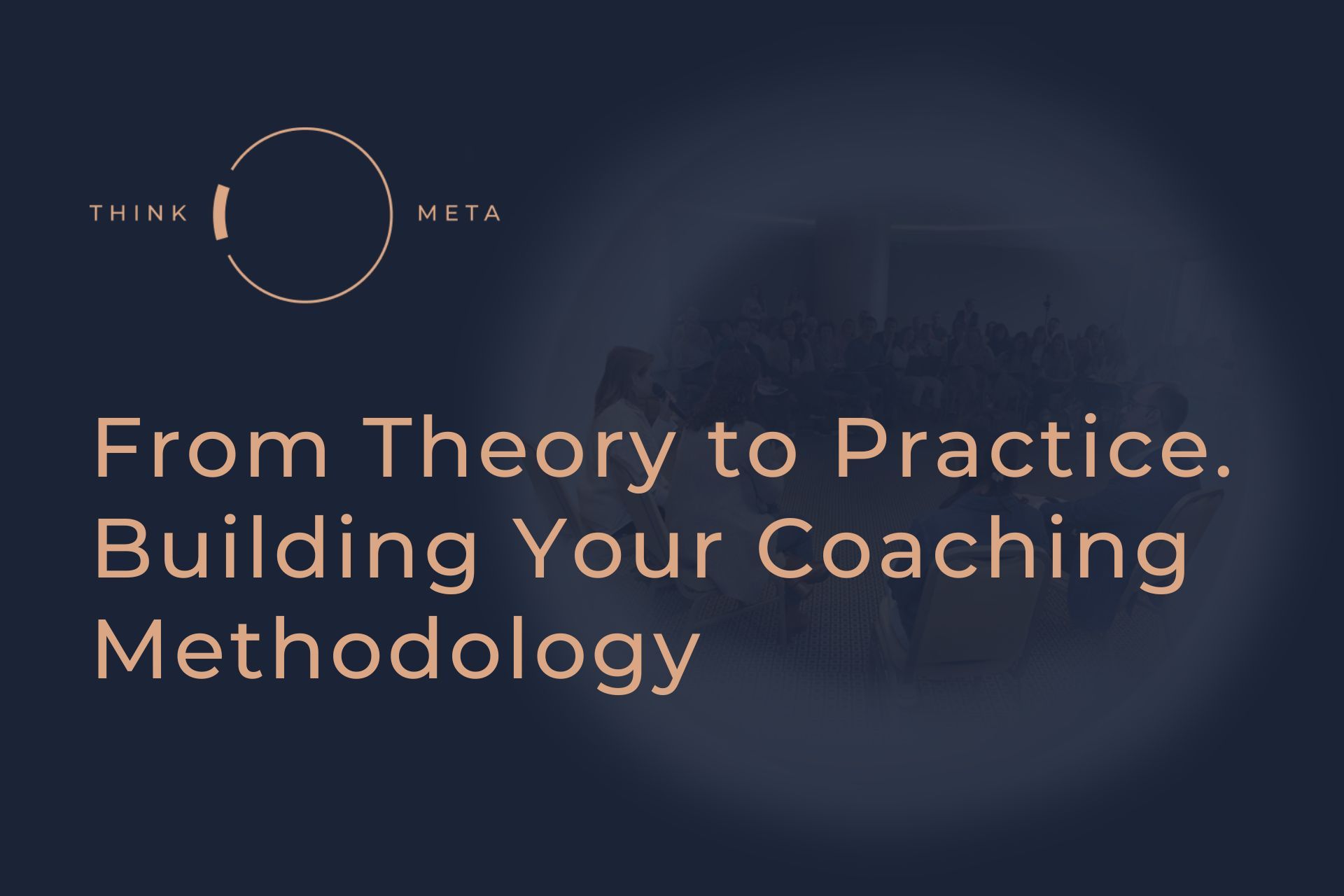Developing a Powerful Coaching Methodology: Combining Theory and Practice

Coaching can be defined as an "emerging cross-disciplinary occupation, its primary purpose being to enhance well-being, improve performance and facilitate individual and organizational change" (Grant, 2005; pp.1).
Grant also stated the key characteristics of coaching:
- A collaborative relationship between client and coach
- Solution-focused approach
- Goal-setting
- Clients are from the general population (without significant psychopathology)
Coaching shares many common characteristics with psychotherapy, counselling, and consulting. However, there are certain features that distinguish coaching from other models and make it the right choice for particular people.
Exploring Established Coaching Theories and Models
In recent years the coaching industry has grown, both in the number of coaches entering the market and in the variety of methodologies. The International Coaching Federation has more than 50,000 active members globally. It goes without saying that many coaches are not members of this association. Additionally, only International coaching offers more than 500 coaching programs.
Knowing all of this, it is not surprising that there is still a lack of research confirming the effectiveness of different modalities. Previous studies have confirmed that certain types of evidence-based coaching (usually cognitive-behaviour approach) are more effective than others. There is also a growing body of literature (Grant, 2003; Green et al., 2005) suggesting that good structure increases the effectiveness of a coaching program.
Although it is hard to name all the different coaching models, Deiorio and colleagues (2022) provided a useful (though incomplete) list of theory-based coaching models:
- Acceptance and commitment coaching
- Appreciative Inquiry
- Cognitive behavioural coaching
- Decisional balance
- Emotional intelligence
- GROW model
- Health and wellness coaching
- Immunity to change
- Intentional change theory
- Motivational interviewing
- Nonviolent communication
- Roleplay
These models are based on different methodologies and theoretical backgrounds, and each of them can be useful in certain contexts for specific people.
Despite differences between the various models and coaching programs, the majority of them can be classified into three subtypes as proposed by Witherspoon and White (1996: cited in Grant, 2005):
- Skills coaching - focus on the development of a particular skill. Sessions are usually very detailed, and the coach might even model the desired skills. Skill coaching is usually short - one or two sessions.
- Performance Coaching - more strategic than skills coaching, the focus is on progress rather than a specific period of time. Performance coaching takes longer than skill coaching (one month to two years). Often relies on the so-called CIGAR approach:
C- current situation
I - ideal situation
G - get from current to ideal situation
A - action plan
R - review process
3. Developmental coaching - deals with various topics from professional and personal life. Typically, in developmental coaching, topics are more intimate and personal. The coaching process is safe and supportive and provides space for reflection and personal growth.
There is some overlap between these categories. This is expected because working on a particular skill (e.g., public speaking) might also positively impact personal growth by, for example, increasing self-confidence.
Practical Application: Integrating Theory and Practice
Nowadays, we know more about the brain and human behaviour than ever. We can use that knowledge as a basis for developing practical interventions. While one of the key characteristics of coaching (regardless of its subtype) is practical application, that doesn't mean that coaching is not based on theories.
The best programs combine theory and practice. To change human behaviour, you need to understand it first. If you want to learn emotional regulation, first, you need to know what emotions are, how they occur, and what they are serving.
A coach's personal history and experience can also be valuable, but a good coaching program cannot be based only on the experience of one person, no matter how reflective they are.
Metacognitive programming is one of the coaching programs that combines practical and theoretical knowledge from various scientific fields such as psychology, philosophy, business, and even physics. Such an integrative approach aims to help clients prosper in various areas of their life.
Designing Your Unique Coaching Methodology: Personalizing the Approach
There are such a variety of coaching programs to choose from that someone thinking of hiring a coach might find it overwhelming. How do you pick the one that best suits your needs? What specific set of skills does a good coach need to have? What is the coaching process supposed to look like? How do you know if coaching is "working"?
Although each of us has unique needs and expectations, we can agree that a good coaching program has a clear structure that follows these steps:
- The initial session - is equally important for both the client and the coach. Clients get a chance to find out more about the coach's methodology and to share their expectations while the coach estimates whether their skill set and knowledge are a good match for the client.
During the initial session, coaches and clients also discuss confidentiality issues, as well as other technicalities such as cancellation fees (Grant & Cavanagh, 2018).
2. Setting goals - to be efficient, the coaching process must rely on clear goals and objectives. If goals are unclear or unrealistic, the chances for failure increase, while client satisfaction will probably not be high.
There is no consensus on the number of goals that someone should be working on at one time. Some coaches prefer working on one or two goals, while others encourage setting more goals and working on various life issues at once (Grant & Cavanagh, 2018).
For example, Metacognitive programming uses so-called life performance management, which allows for setting multiple goals and improving a client's life in all categories and directions simultaneously.
When deciding on the number of goals, it is also important to take client preference into account. They often know best what works for them. If they are unsure, try setting one or two goals to start, later adding more if desired.
Also, do not forget to set up SMART goals. That means that goal should be Specific, Measurable, Achievable, Realistic, and Timely.
3. Developing an action plan - once the client and coach agree on objectives, it is time to define an action plan, i.e., small steps and changes that will lead the client towards their goal.
At this phase, it will be evident if goals are poorly defined. For example, it is much easier to work on and see objective results if someone picks "a better relationship with my mother" as a goal instead of "being happy."
Of course, there is nothing wrong with wanting to be happy. A good coach will use that statement as a starting point for defining specific subgoals in different areas of life. Working on them will increase the overall sense of happiness. See the difference?
4. Monitoring and evaluation - no matter how good the action plan is, some revisions will almost always be necessary.
Sometimes, during the coaching process, the client discovers other topics that they wish to explore further. It is also common for the client to face unanticipated obstacles. Finally, some clients progress quickly, so revision of the plan is required.
Monitoring and evaluation should happen throughout the entire process and not just at the end. This is the only way the client will benefit from evaluation.
Often, coaches assign clients homework as part of the coaching process. Reflecting on these assignments can serve as good monitoring and evaluation practice. Also, it is useful to evaluate each session and give the client a chance to share their insights (Grant & Cavanagh, 2018).
5. Ending the coaching process - one of the reasons for the growing popularity of coaching is likely due to the fact that, generally speaking, it is a solution-focused and relatively short intervention (in the case of skills coaching, sometimes only one session is needed).
However, sometimes ending the coaching process can be a hard step for both the client and the coach, especially if they had good cooperation and connected on a deeper level.
Some authors (e.g., Grant & Cavanagh,2018) recommend agreeing on the duration of the coaching process during the first session (e.g., how many sessions, what are acceptable results, etc.). They can later revise the initial plan according to needs.
The goal of coaching is to help people discover and develop their potential, not to become emotionally dependent on their coaches.
As we already mentioned, having a clear structure is one of the key conditions for creating an effective coaching methodology. Another important factor is personalisation. Good coaching programs utilize the coach's knowledge and skills (both professional and personal) in the most effective way. To be successful, coaches should rely on techniques and methodologies that feel natural to them. Coaches should also select ways and steps that are most efficient for each client.
Measuring the Effectiveness of Your Coaching Methodology
One of the most crucial phases in developing your coaching process is measuring the effectiveness of your coaching methodology. This is important because it allows you to improve your techniques over time, greatly benefiting your clients. Additionally, measuring effectiveness helps you monitor the progress of each client and provide them with individualized solutions. Finally, collected data can help you improve your credibility. Most people like to know what they can expect and how significant an improvement can be.
The best approach for measuring the effectiveness of coaching is a combination of standardized psychological tests and those specifically designed for the particular coaching program you're using. There are plenty of questionnaires that will help you objectively measure subjective well-being, self-confidence, levels of anxiety, stress, depression, motivation, etc. Using quantitative data will enable you to objectively compare different methods and test which approach works best for any particular issue.
Finally, it is also important to identify coaching programs that provide long-term effects. Although temporary relief can be beneficial, the goal of coaching is a permanent change and continual personal growth.
Some studies show that coaching can provide long-term effects. For example, coaching with feedback was more efficient than training only, and the results were still evident in the 12-month follow-up study (Miller et al., 2004). Similarly, another study (Libri & Kemp, 2006) showed that coaching increased sales performance and self-evaluation, and these effects persisted even after 18 months of follow-up.
Take every opportunity to get feedback (whether it is self-evaluation, client feedback, or independent study). Observations which pinpoint some deficiency in your program are particularly useful. Use them for learning and improvement. There is no perfect program, but with science-based progress and increased knowledge of human nature, your coaching practice will evolve and grow.
The Journey to a Powerful Coaching Methodology
Creating your own effective coaching program requires time, experience, and many mistakes. Translating theoretical knowledge into practice is not always an easy task. You need to test, evaluate and modify techniques until you find a set of effective tools.
Many coaching and psychotherapeutic modalities also have an interesting human story behind them. Metacognitive programming is no exception.
Presently, the Metacognitive Programming Academy employs over 75 coaches in 26 countries around the globe. They conduct up to 4,000 sessions every month. Additionally, over 50,000 people have been trained, and more than 500 coaches have been certified. This all started as a side project for Misha Saidov, founder of the Metacognitive Programming Academy.
So what is the secret? If you ask Misha, he will say, "My work is simple. I help people accept what they cannot change and change what they should not accept. The only accolade I feel comfortable crediting myself with is my ability to take powerful concepts from psychology, biology, coaching, business, and philosophy and link them to the system I call 'Metacognitive Programming.' My unique strength is filtering what doesn't matter from the things of utmost importance."
In other words, Metacognitive Programming combines theory and practice. The clear structure, which was proven as a factor in improving the effectiveness of the coaching process, is also a key characteristic (e.g., Grant, 2003; Green et al., 2005).
A successful coaching methodology is in line with the coach's values and beliefs. The coach's authenticity is often more important than any certification or theoretical knowledge (although they are also important). Be inspired by others but create your own success story.
Literature:
Deiorio, N. M., Moore, M., Santen, S. A., Gazelle, G., Dalrymple, J. L., & Hammoud, M. (2022). Coaching models, theories, and structures: An overview for teaching faculty in the emergency department and educators in the offices. AEM education and training, 6(5), e10801. https://doi.org/10.1002/aet2.10801
Grant, A. M. (2003). The impact of life coaching on goal attainment, metacognition, and mental health. Social Behavior and Personality: an international journal, 31(3), 253–263.
Grant, A. M. (2005). What is evidence-based executive, workplace and life coaching?. In Evidence-Based Coaching Volume 1: Theory, Research and Practice from the Behavioural Sciences (pp. 1–13). Bowen Hills, QLD: Australian Academic Press.
Grant, A. M., & Cavanagh, M. J. (2018). The solution-focused approach to coaching. The complete handbook of coaching, 35-51.
Green, S., Oades, L. G., & Grant, A. M. (2005). An evaluation of a life-coaching group program: Initial findings from a waitlist control study. The complete handbook of coaching, p. 127–1411.
Libri, V. & Kemp, T.(2006). Assessing the efficacy of a cognitive behavioural executive coaching programme. International Coaching Psychology Review, 1 ( 2 ), 9 – 18.
Miller, W.R., Yahne, C.E., Moyers, T.B., Martinez, J., and Pirritano, M.( 2004 ). A randomized trial of methods to help clinicians learn motivational interviewing. Journal of Consulting and Clinical Psychology, 72 ( 6 ), 1050 – 62.

